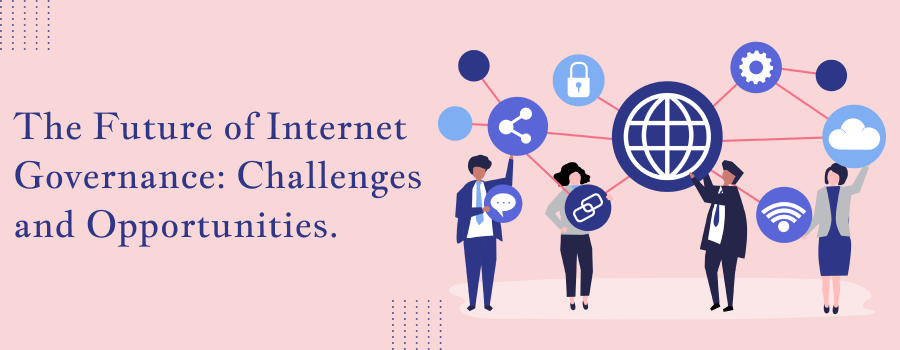Posted on: Oct 1, 2024
Estimated reading time: 0 minutes
The Future of Internet Governance: Challenges and Opportunities.

Introduction:
In addition to bringing about previously unheard-of levels of innovation and connectedness, the digital age has also presented new issues that need to be addressed in internet governance.
As the twenty-first century progresses, policymakers, tech companies, and international citizens are increasingly debating the future of Internet governance. This blog examines the major obstacles and possibilities influencing Internet governance in the future, emphasizing the necessity of flexible approaches to handle the changing digital environment.
Understanding Internet Governance:
Internet governance is about the regulations and guidelines that oversee the Internet. This includes all aspects, from the development of websites to the safeguarding of information. Major entities, authorities, and technology firms are all involved in this area.
Given the swift advancements in technology, it's crucial to grasp how governance will evolve.
It's not merely about regulating entry; it's about establishing a secure and equitable digital space for all. Imagine it as a gathering of a community where each person is given the opportunity to speak.
Yet, occasionally, not all voices are given the same weight.
Challenges in Internet Governance:
Cybersecurity risks:
As the number of individuals using the internet grows, the danger of cyberattacks also rises. Cybercriminals are getting more advanced, and their attacks can interfere with companies and intrude into our private lives.
It is still extremely difficult to ensure strong cybersecurity safeguards for the protection of private information, national security, and business interests.
The growing complexity of cyberattacks necessitates ongoing innovation and cross-border cooperation to improve defense tactics.
Fake news as well as misinformation:
In our quick-moving society, false information spreads rapidly. It's similar to gossip in a school corridor that expands as more people talk about it. It's essential to combat fake news to keep faith in the reliability of information.
What methods can we develop to more effectively confirm the authenticity of content on the internet?
The spread of false information and deliberate lies on the internet is a major danger to the confidence people have in each other and the health of democratic systems.
Creating successful plans to fight against bogus news and guarantee the truthfulness of data is essential for keeping the honesty of online discussions.
Concerns regarding data privacy:
Each time we hit the "like," "share," or "click" buttons, our information is gathered. It's like the internet maintains an extensive journal of our activities. Individuals are growing more conscious of their privacy rights.
Data privacy worries have grown as big data and AI have become more prevalent. It can be difficult to strike a balance between the necessity of data collection and people's right to privacy.
So yes, it is a serious issue as well for internet governance.
The digital gap:
The difference in online connectivity across various areas and groups forms an online divide. Tackling this gap is crucial for fostering growth that includes everyone and making sure that the advantages of the digital economy are available to everyone.
Now let’s see the opportunities in Internet governance:
Widespread Internet Access and International Collaboration:
Think of a society in which everyone has access to the internet, much like a public library. Increased employment, communication, and educational opportunities can result from greater connectivity. We can close the digital divide and strengthen communities all across the world with the appropriate policies.
Internet governance is a worldwide issue, not limited to a single nation or organization. Collaboration efforts to address cross-border issues like cybersecurity threats and data privacy concerns can be facilitated by international organizations and agreements.
Innovation in frameworks for policies:
The changing landscape of the internet requires creative policy structures. Adopting versatile and responsive methods of governance can aid in tackling new problems and promoting technological advancement.
Development in Governance Structures:
As our communities change, our systems of leadership must also adapt. New approaches, powered by advancements in technology, can make the process of making decisions more efficient. It's similar to moving from a basic flip phone to a more advanced smartphone for enhanced features and ease of use.
Progress in areas like blockchain and AI opens up fresh opportunities for improving how the internet is governed. These innovations can boost openness, safety, and effectiveness in handling online actions and information.
Partnerships between the public and private sectors:
Working together, governments, technology firms, and community groups can push for successful management of the Internet.
Joint efforts between the public and private sectors can use the knowledge and assets of different parties to create and put into action strategies for addressing issues related to internet management.
Conclusion:
The path ahead for managing the internet is influenced by a constant interaction of obstacles and chances. As we move through this changing online world, it's crucial to encourage worldwide collaboration, develop new policy structures, and welcome new technologies.
The web isn't merely a device; it's an integral aspect of our daily existence. The way the internet is managed in the future will determine how we communicate, acquire knowledge, and form relationships. It's crucial to participate in these discussions now.
Each individual has a responsibility—be it as a consumer, decision-maker, or innovator in technology.
By tackling the obstacles directly and taking advantage of the chances that come our way, we can create a more protected, welcoming, and effective online future.